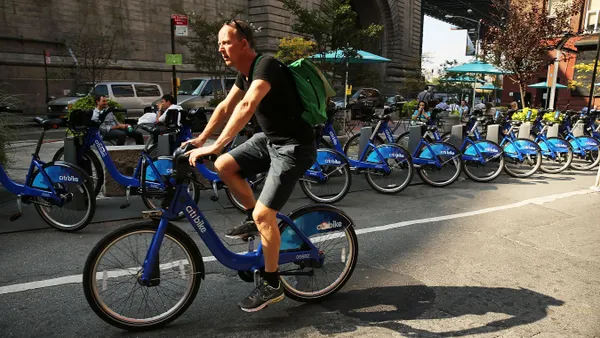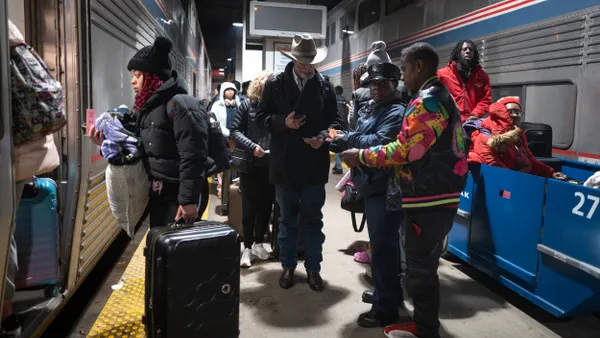Dive Brief:
- Here Technologies and Verizon have announced a partnership to leverage co-innovation by coupling Verizon's 5G network and edge computing platforms with Here's data and location technology and autonomous vehicle knowledge.
- The partners will first collaborate on pedestrian and vehicle safety measures, such as collision avoidance and better visual positioning service (VPS) navigation and location identification. Future applications would leverage a mobile phone inside a car; the collision avoidance system, for example, would detect moving objects on the street and send alerts to the user through their phone.
- The partners intend to eventually expand their collaborative efforts into a variety of use cases beyond collision avoidance and VPS. "The angle that we are trying to approach and to advance is what happens when you bring technologies like 5G together with advanced locations and mapping platforms," Hervé Utheza, Here Technologies chief of data strategy, told Smart Cities Dive. "We're basically putting the two companies in a position to address the needs of lots of different industries, and today we're showcasing the first fruits of that initiative."
Dive Insight:
Thus far, much of the talk around 5G has been how, when and where it will be deployed. But this collaboration advances the conversation to focus on what 5G can do when combined with other technologies.
"The level of automation, the level of safety can become smarter as you now get into areas where 5G is deployed, where it's having very advanced HD, high resolution maps that Here has in its system," Utheza said. "You're going to see expressions of advanced services that are going to be growing in coverage as the alignment and deployment of 5G goes on."
Navigation systems assume that a user will be driving everywhere — not just a small area where 5G is first available — so the partners are focusing on widespread safety improvements regardless of current 5G access. Utheza suggests that Verizon will inform customers across the United States when the features they're devising become available.
Early connected car technology has centered on the internal vehicle environment including automatic start or temperature control, but the next wave of advancements center on interactions with the external environment, Utheza said. Sensors installed throughout a city interact with those inside a car, and they are further enabled through 5G.
The first Verizon and Here collaboration harnesses connected vehicles' abilities, but focuses on phone-based services. Thus, the collision avoidance and VPS eventually could be applied to other forms of mobility such as scooters and electric bikes.
"5G is much more than just greater bandwidth for your phone. 5G is distributed computing because now you can put more computers in a 5G antenna that's alongside the city sidewalk. And suddenly the computing power available to the phone or device or scooter is much more powerful than what a single mobile handset would do," Utheza said.
Here Technologies and Verizon will devise a multiyear roadmap for deploying technologies for other modes of mobility, but the partners first need to perfect the core technology, Utheza said. "Ultimately, they're going to find their incarnation into lots of services or products well beyond the phone or the car."
Further developments could include integrating the mobility and location services with advanced social media applications.
"One trend which is starting to intrigue me is the social aspect of some of those experiences. We are just at the beginning of trying to go beyond social media for sharing a picture or article. We're going to see much more sharing of 'experiences,'" Utheza said.
For example, a parent at home could enable a mobility- and location-based social "experience" when their child takes the connected car for a test drive for the first time.
"The partnership understands so well that social and family and personal impact is so important to get right," Utheza said.
Another aspect that's important to get right is security and privacy. Utheza points out that such elements are more strict in Europe than in the United States with the passage of the General Data Protection Regulation (GDPR), but he anticipates greater action domestically in the coming years. That could involve adjusting technological systems and providing better consumer education about security and privacy, especially for younger generations who frequently and willingly share profuse amounts of personal data.
EDITOR CORRECTION: The first bullet of this story has been updated to better reflect each company's role in the partnership.










